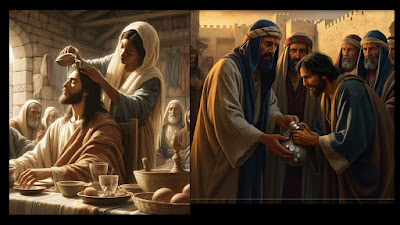In Mark 14:1–11, two key events are described:
The Anointing at Bethany (Mark 14:3–9)
Jesus is in Bethany at the house of Simon the Leper. During a meal, a woman comes in with an alabaster jar of very expensive perfume made of pure nard. She breaks the jar and pours the perfume on Jesus’ head, anointing him. Some of the people present criticize her, saying the perfume could have been sold and the money given to the poor. Jesus defends the woman, saying she has done a beautiful thing in preparing his body for burial ahead of time. He says that her act will be remembered wherever the gospel is preached.
Judas’ Betrayal (Mark 14:10–11)
After this, Judas Iscariot, one of Jesus' twelve disciples, goes to the chief priests and offers to betray Jesus to them. The chief priests are pleased and promise to give Judas money. From that point on, Judas looks for an opportunity to hand Jesus over to them.
Contrasting the Two People
In Mark 14:1–11, the anointing of Jesus by the woman and Judas' betrayal present a sharp contrast between two distinct actions and attitudes.
The Anointing by the Woman (Mark 14:3–9)
Devotion and Love: The woman shows deep devotion to Jesus by using an expensive perfume to anoint Him, an act of great personal sacrifice. The perfume, likely worth a year’s wages, symbolizes her wholehearted love and reverence for Jesus.
Selflessness: She pours the perfume without concern for its cost, focusing solely on honoring Jesus. Her act is pure, uncalculated, and driven by love.
Recognition of Jesus’ Mission: Jesus commends her, explaining that she has prepared His body for burial, recognizing that her act aligns with His impending death and sacrifice.
Eternal Legacy: Jesus declares that her act of devotion will be remembered wherever the gospel is preached, highlighting the significance of her love and sacrifice.
Judas' Betrayal (Mark 14:10–11)
Betrayal and Greed: Judas, one of Jesus’ closest disciples, chooses to betray Him for money. His decision contrasts with the woman’s sacrifice, as Judas seeks personal gain at Jesus' expense.
Selfishness: Unlike the woman, who gives freely, Judas takes advantage of his relationship with Jesus for financial reward. His motives are driven by greed and personal ambition.
Rejection of Jesus’ Mission: While the woman honors Jesus and acknowledges His path to the cross, Judas rejects Jesus' mission and aligns himself with His enemies. His betrayal paves the way for Jesus’ arrest and eventual crucifixion.
Eternal Infamy: Instead of being remembered for devotion, Judas is remembered for his act of betrayal, becoming a symbol of treachery and moral failure.
The anointing by the woman reflects devotion, love, and sacrifice, while Judas' betrayal exemplifies greed, selfishness, and treachery, highlighting two vastly different responses to Jesus.
More: Sabbath School Lesson 11 Book of Mark

So love and sacrifice were the common areas where we can avoid greedy,pride , selfishness within our hearts
ReplyDeleteJudas had the opportunity to repent to be saved like the thief deed but his heart was consumed with greed
ReplyDelete